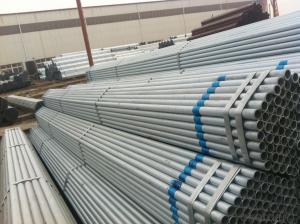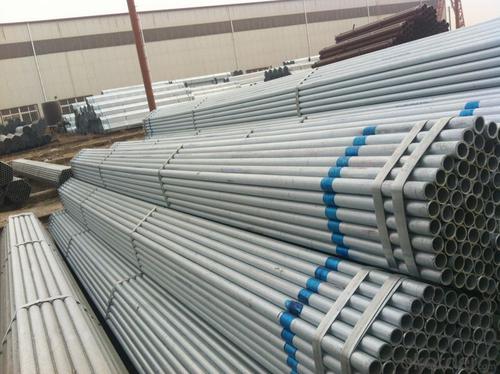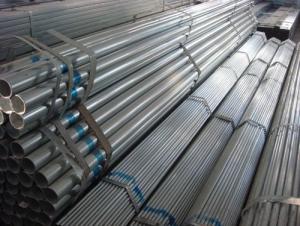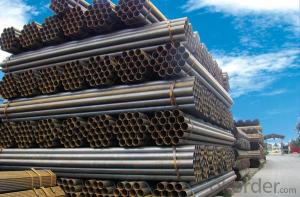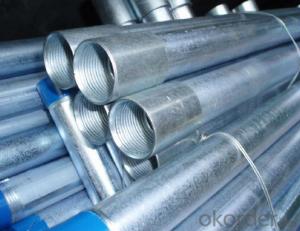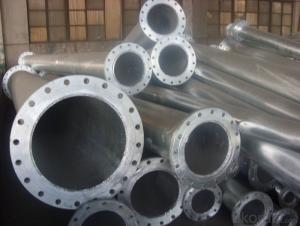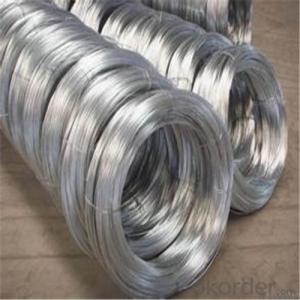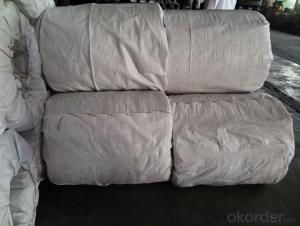hot dipped galvanized scaffolding pipe
- Loading Port:
- China Main Port
- Payment Terms:
- TT OR LC
- Min Order Qty:
- -
- Supply Capability:
- -
OKorder Service Pledge
OKorder Financial Service
You Might Also Like
O.D | O.D tolerance | W.T | Thickness Tolerance |
1/2-12'' | ±0.3mm | 1.5-12 MM | ±8% |
Length | 3m,4m,5.8m,6m or according customers' requirements | ||
Certificate | ISO9001-2008,EN10210,API,Raw material cert,Mill cert,Reap on site inspection report,SGS,BV | ||
Standard | ASTM A53/ASTM A36 BS1387/BS1139/EN39/EN10219/EN10217/EN10297/EN10296/EN10025 etc | ||
Material | Q195/215/235/345, SS330/400/500, S235JR/S235JQ/S235J2, etc | ||
Inspection | With Hydraulic Testing, Eddy Current , Infrared Test, etc | ||
Technique: | Welded Hot rolled,heat extrusion | ||
Packing | in bundle or in bulk, PVC in blue or in strip | ||
Usage | For construction, Pluid and Greenhouse | ||
Main market: | Middle east,North and South America, East and West Europe, South and southeast Asia,Australia,Africa, | ||
Place of Origin | China | ||
HS code: | 73063090 | ||
Productivity | 2000Ton/Month | ||
Processing | galvanzied,inner and outer stab clean,bevelled oiled,painted black threading,with coupling and plastic caps protected packing in plastic cloths,3PE,FBE,corrosion resistant coating | ||
- Q: Can steel pipes be recycled?
- Yes, steel pipes can be recycled. Steel is one of the most commonly recycled materials in the world, and steel pipes can be melted down and reused to make new steel products. Recycling steel pipes helps conserve natural resources and reduces the environmental impact of manufacturing new steel.
- Q: What are the factors that affect the pressure rating of steel pipes?
- The pressure rating of steel pipes can be influenced by various factors. These factors include the strength of the material used, the thickness of the pipe wall, the diameter of the pipe, the temperature at which it operates, its resistance to corrosion, compliance with manufacturing standards, and the impact of external loads. The strength of the steel plays a crucial role in determining the pressure rating. Steel with higher strength can handle higher pressure levels, while weaker grades may have lower ratings. Thicker walls provide more resistance against internal forces, allowing pipes to handle higher pressures. The diameter of the pipe also affects its pressure rating. Larger pipes generally have higher ratings due to their larger cross-sectional area. High temperatures can weaken steel, reducing its strength and pressure rating. Therefore, maximum operating temperature should be considered. Corrosion can weaken the pipe material over time, leading to a decrease in pressure rating. Factors such as fluid type, pH levels, and environmental conditions can impact corrosion resistance. Compliance with industry standards is crucial in determining pressure ratings. These standards ensure proper manufacturing techniques and materials are used. External loads such as soil settlement or traffic can affect pressure ratings. Proper design, installation, support, and protection are necessary to maintain the pressure rating. Considering all these factors and consulting industry guidelines is important for determining appropriate pressure ratings for steel pipes in different applications.
- Q: What are the factors to consider when selecting steel pipes for a specific application?
- When selecting steel pipes for a specific application, factors such as pipe diameter, wall thickness, material grade, corrosion resistance, temperature and pressure requirements, environmental conditions, and cost should be considered. Additionally, factors like durability, strength, weight, ease of installation, and compatibility with other components in the system should also be taken into account.
- Q: Are steel pipes suitable for wastewater treatment plants?
- Yes, steel pipes are suitable for wastewater treatment plants. Steel pipes are commonly used in wastewater treatment plants due to their high strength and durability. They can withstand high pressure and are resistant to corrosion, making them ideal for carrying wastewater and other fluids in the harsh conditions found in treatment plants. Additionally, steel pipes can be easily welded and joined, allowing for flexibility in the design and installation of the piping system. Overall, steel pipes are a reliable and cost-effective choice for wastewater treatment plants.
- Q: Are steel pipes suitable for solar power plants?
- Yes, steel pipes are suitable for solar power plants. Steel pipes are often used in the construction of solar power plants due to their durability, strength, and resistance to corrosion. They can be used for various purposes in a solar power plant, including the transportation of fluids such as water or heat transfer fluids, as well as providing structural support for solar panels and other equipment. Steel pipes are capable of withstanding high temperatures and pressure, making them ideal for the efficient operation of solar power plants. Additionally, steel pipes are readily available and cost-effective, making them a popular choice in the construction of solar power plants.
- Q: Can steel pipes be used for underground air supply systems?
- Indeed, underground air supply systems can make use of steel pipes. Due to their robustness, endurance, and ability to withstand external forces like corrosion and impact, steel pipes are frequently employed in underground settings. They possess the capacity to endure the pressure and temperature prerequisites of air supply systems while also being effortlessly installed below ground. Moreover, steel pipes boast an extended lifespan, rendering them a financially prudent option for underground air supply systems. Nonetheless, when selecting the suitable steel pipes for a particular underground air supply system, it is crucial to take into account factors such as soil conditions, potential for corrosion, and local regulations.
- Q: How are steel pipes used in the manufacturing of ships?
- Steel pipes are used in the manufacturing of ships for various purposes, including structural support, fluid transportation, and ventilation systems. They are commonly used to create the framework of the ship, providing strength and stability. Additionally, steel pipes are used to transport fluids such as water, oil, and gas throughout the vessel. They are also utilized in the ship's ventilation system to ensure proper air circulation and maintain a safe environment for crew members.
- Q: What are the factors to consider when selecting the right steel pipe for a specific application?
- When selecting the right steel pipe for a specific application, there are several factors to consider. These include the type of fluid or gas that will flow through the pipe, the temperature and pressure conditions of the application, the size and diameter requirements, the level of corrosion resistance needed, the cost and availability of the steel pipe, and any specific industry standards or regulations that must be followed.
- Q: What are the different grades of steel used in manufacturing pipes?
- There are several grades of steel used in manufacturing pipes, including carbon steel, alloy steel, stainless steel, and duplex steel. Each grade has distinct properties and characteristics that make it suitable for different applications and environments.
- Q: How are steel pipes specified in engineering drawings?
- Steel pipes are specified in engineering drawings by providing information such as the diameter, length, wall thickness, material grade, and any other relevant specifications or standards that need to be followed.
Send your message to us
hot dipped galvanized scaffolding pipe
- Loading Port:
- China Main Port
- Payment Terms:
- TT OR LC
- Min Order Qty:
- -
- Supply Capability:
- -
OKorder Service Pledge
OKorder Financial Service
Similar products
Hot products
Hot Searches
Related keywords
